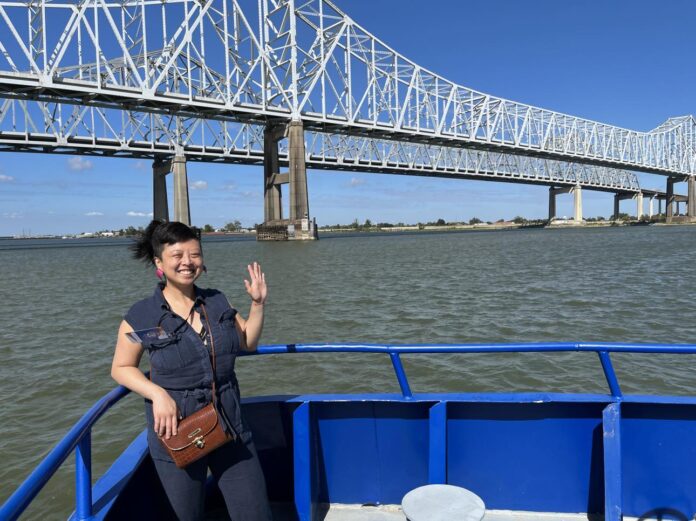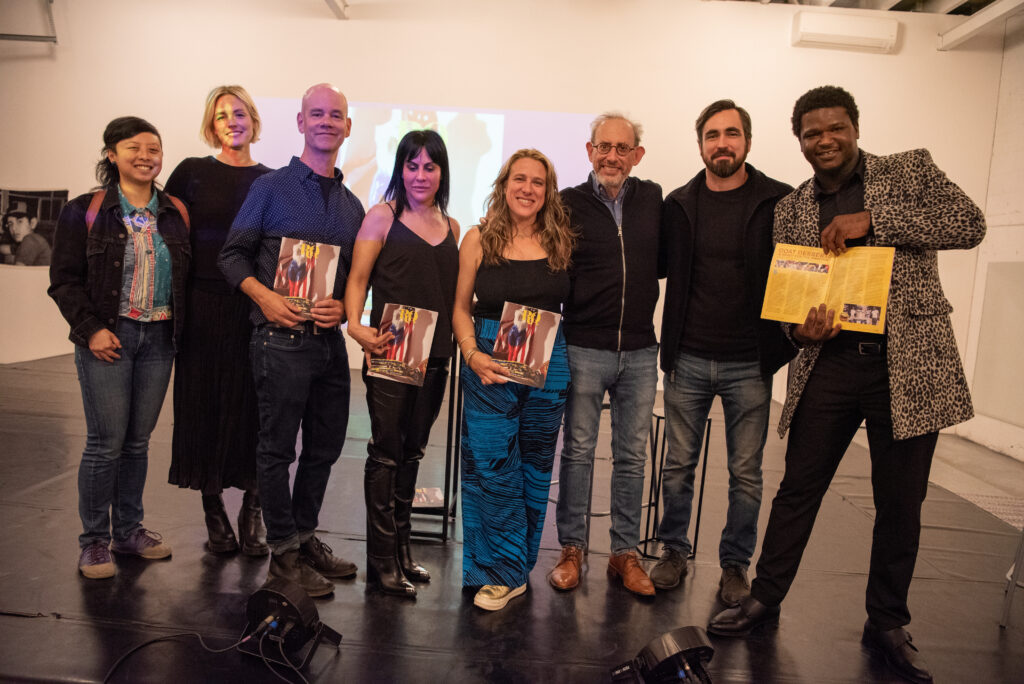
“I think a lot of the time when I do something really well, you don’t know I existed,” said Diana Lu (she/they) about her work shaping communities across Philadelphia and amplifying their stories. It’s hard to find one term that would describe the tangible impact she’s had on the area because her work has taken so many forms.
Lu came to Philly from California 15 years ago to attend a graduate program at the University of Pennsylvania. This led to an early career that aligned with her degree in city planning before she shifted to roles that support local media. She’s leaving Philadelphia soon — heading to Chicago for a new role as Senior Program Officer for Journalism and Media at the MacArthur Foundation.
“I really understand — working for WHYY and now MacArthur — the significance of public media especially for non-native English speakers and low-income families,” she explained. “I didn’t have cable, and I was a latchkey kid too. Public media was such an important resource for me.”
During her teen years, Lu developed relationships with journalists due to her work as an environmental activist.
“It was really cool to have a relationship with a local reporter and know that my perspective mattered,” said Lu — who would later empower others to share their own stories and opinions at WHYY before supporting hyperlocal initiatives as both a content creator and funding specialist.
“Community radio is like a public park and they want people to be a part of it,” she said about the importance of projects like Germantown Community Radio. Her interest in this and other hyperlocal projects — which offer a platform to a specific group of people who might not otherwise find a place to discuss their own needs and concerns — could stem from childhood.
“I was really raised by village aunties, and the news they liked to consume the most is probably channel 18 — which was the Chinese language news site,” said Lu, who was so thankful for those resources which allowed her mom and older generations in her community to better understand more about the work she was doing.
Lu has always been passionate about learning and has always wanted to use the knowledge she gathers for good. In her city planning era, she worked for Philadelphia’s commerce department and for nonprofits supporting small businesses — helping owners access grants and leverage resources, ensuring they know their rights, and equipping them to achieve their goals. She also led initiatives that promoted neighborhood development — including planning and implementing some of Chinatown’s biggest festivals that honor Asian food and culture.
“I was folding in aspects of community organizing that were ingrained in me,” Lu said about being an advocate for people and communities in those positions.
This drive to empower others led Lu to WHYY, where she was Community Engagement Editor for PlanPhilly — keeping Philadelphians informed about the formal processes and city developments that impact their neighborhoods. In this role, she bridged her city planner experience with her passion for connecting people with each other and helping them understand how their communities take shape.
“I worked to break down complicated city planning topics and processes and issues and opportunities — to make the information just a lot more transparent and easy to understand in order for people to take actions,” said Lu, who also wrote about the fun stuff in a way that educated readers — like how to utilize pop-up events to more effectively reap long-term benefits. That article was incorporated into coursework for future city planners as assigned reading.
“I was still doing what a city planner does — which is to understand how something fits into a larger whole and strategically, over time, earn trust and foster relationships to develop joint ventures,” she said, adding that the job also allowed her to “give the mic” to community members so they could share their own thoughts about what’s happening across their city.
Lu is excited about innovative ways people are sharing information. She highlighted that some organizations in Philadelphia are using “low-fi” alternatives to traditional publishing avenues — such as WhatsApp — to distribute news. As someone with a nontraditional entry point to the industry, she also believes it’s important to train non-journalists in media literacy and information dissemination. This especially improves options for collecting and sharing information to underrepresented groups of people.
The Women’s Community Revitalization Project offered Lu both community and new strategies she could use in her work. Lu, who is pansexual and queer, was inspired by the leadership of queer women in that space — who kept the group fed when they attended the first women’s march together and ensured there was appropriate transportation for disabled participants.
“I learned a lot about coalition building and board and meeting models from WCRP, including providing childcare at meetings,” she said. “This informed me as a funder to add those line items in sponsorships when trying to make events more accessible.”
Lu and a WCRP friend helped design and launch the Change the Narrative Fellowship with Women’s Way, which aims to empower women who have experiences of poverty n Philadelphia by sharing their stories and expertise through journalism.
Another series she tackled at PlanPhilly incorporated her love for the way aspects of life intersect. She wrote about water ice flavors based on individual neighborhoods — a 2018 collaboration between Little Baby’s Ice Cream and local nonprofits which highlighted the history and immigration patterns of specific areas. Lu’s writing underlined the project’s creative approach to teaching about culture.
“I’m really passionate about connections to immigration and food patterns and how that ties to community organizing,” she said, noting that she hopes to get to know Chicago “stomach first.”
Some of her achievements in Philadelphia — such as securing funding for infrastructural improvements — make the city more accessible and safe. She’ll miss being able to stroll by specific lampposts, parklets and bike corrals knowing she played a part in their development.
“I think some of the proudest things that I’ve done have been linked to the built environment,” she said. “So I will deeply miss seeing that and miss not being able to visit so many businesses that I’ve worked with for so many years.”
In Lu’s new role, she’ll support news and media organizations across the country rather than focus on local projects as she has in the past.
“At MacArthur, I’m in a position to see what the trends are and be a connector between people,” Lu said about organizations working toward similar goals who might have resources or ideas to share. She’s looking forward to watching how her current connections in Philadelphia morph over time and knows that meaningful collaborations will continue to find a way to emerge.

Lu will remain tied to the city through Root Quarterly, a Philadelphia-based publication and events-linked community, where she writes about food and places — and often, how the two intersect.
In her work for the publication, Lu helps to cultivate conversations “not about what’s shiny and new — but about businesses and organizations and restaurants that tie in often multiple generations or at least a few decades of impact on Philadelphia — especially during a time when people didn’t want to visit,” she said.
Lu is interested in the people and places who often go unnoticed — those that anchor us and shape our neighborhoods, whether we realize it or not. She’s done the same quiet and intentional work and is leaving behind a city she’s tended and cared for so that Philadelphians could better understand it and enjoy it.
Her friend once told her, “Even if you leave a space, it doesn’t mean you leave the community.”
“It took me a long time to have the confidence to call myself a Philadelphian,” said Lu, who felt like an outsider when she first arrived. “But now that I’m going to Chicago, I’m getting comfortable saying I’m coming from Philly — not just as a place but as a Philadelphian.”